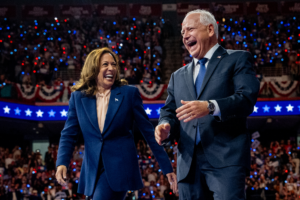In a recent interview, Republican vice presidential nominee JD Vance aimed to shift the narrative against Democratic rival Tim Walz, labeling the Minnesota governor as “weird” and accusing him of dishonesty. Vance’s comments come as part of a broader effort to redefine the campaign’s dynamics, especially amid the shifting political landscape following Joe Biden’s exit from the presidential race.
During an interview, Vance scrutinized Walz’s behavior during a rally where Vice President Kamala Harris introduced him as her running mate. Vance highlighted an incident where Walz shook his wife’s hand before hugging her, describing it as an awkward gesture. Vance contrasted this with his own display of affection towards his wife, suggesting that Walz’s actions reflected discomfort and a lack of authenticity, which he attributes to the Democratic ticket’s uneasy stance on their policy positions.

The new law of “weirdness” in the campaign extends to Walz’s military record. Vance criticized Walz for allegedly embellishing his military service, particularly in relation to his claims about serving in combat. Although Walz served in the Army National Guard, his deployment was to Italy, not a combat zone. Vance contends that Walz misrepresented his service for political gain, a claim that Walz’s campaign describes as a misstatement.
Vance also voiced concerns about Kamala Harris’s judgment in selecting Walz as her running mate. He questioned Harris’s credibility and accused her of failing to address the alleged dishonesty surrounding Walz’s military service. Vance’s remarks aimed to undermine Harris’s decision-making and cast doubt on her ability to lead effectively.
As the election approaches, Vance and Trump face a more competitive race due to Biden’s departure and Harris’s rise as the Democratic nominee. Vance acknowledged the altered landscape, noting that the campaign now involves contrasting Trump’s policies with those of the Biden-Harris administration. He argued that Harris, rather than Biden, effectively influences the administration’s policies, given Biden’s perceived cognitive limitations.
On other issues, Vance discussed Trump’s position on abortion, asserting that Trump would not seek to block access to the abortion drug mifepristone but would leave abortion policy decisions to individual states. He expressed empathy for women facing difficult medical situations but maintained that voters should ultimately determine abortion policies.
Vance also supported Trump’s view that presidents should have a say in Federal Reserve policy, challenging the central bank’s historical autonomy. He argued that significant economic decisions, such as interest rates, should involve democratic debate and input from elected leaders.
In addition, Vance criticized Harris for her shifting policy positions, accusing her of presenting different policies to different audiences. He described her campaign as insincere and scripted, claiming that Harris’s inconsistent stances reflect a lack of genuine policy commitments.


















